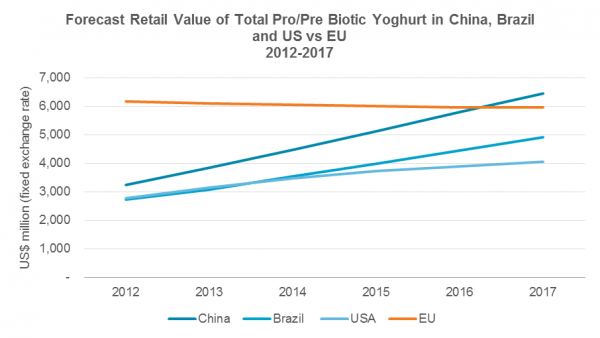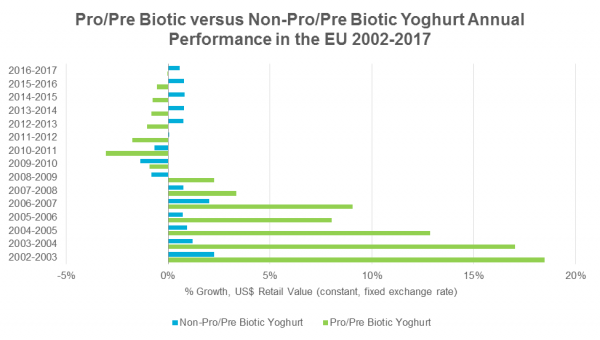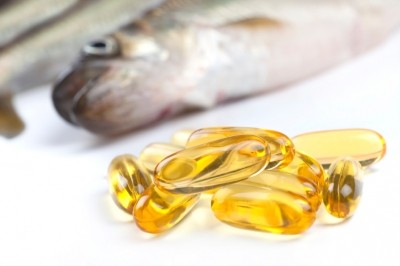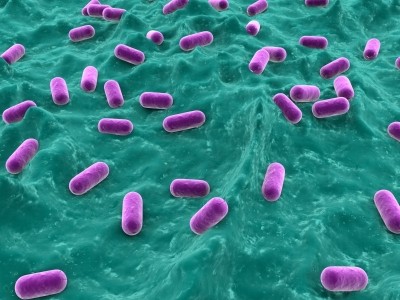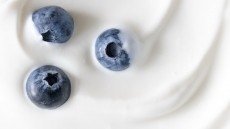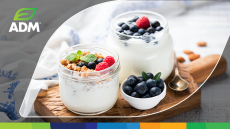Global digestive breakdown: Pre-probiotic yoghurt still number 2 in functional food

Probiotics remain the leading functional food ingredient globally and ranks second in terms of absolute constant value growth of fortified/functional food products, behind infant milk formula.
Even the somewhat contentious issue of probiotics not gaining a single European Union article 13.1 health claim is not forecast to dampen the growth of pro/prebiotic yoghurt – the main product format for probiotics – across the globe.
In 2013, pro/prebiotic yoghurt is set to grow by US$1.7bn globally in constant value terms, from a base of $26.8bn in 2012 (up 4% on the previous year). Sales growth will be driven primarily by three countries, the US, Brazil and China, which will witness constant value growth of over $300m.
Chobani brand grows $1bn globally between 2010-2012
A variety of products are driving global growth. The huge success of the Greek yoghurt brand Chobani is driving sales in the US – the brand saw retail value sales of $1.4bn in 2012 – while growing awareness of nutrition is propelling interest in emerging markets. In Asia Pacific, Yakult is maintaining its lead, with sales worth $2.3bn in 2013. In Latin America, Danone Group’s Activia brand just beat Yakult to be the forerunner, with a retail value of $1.1 bn.
Sales of pro/pre biotic yoghurt in decline in EU
In the EU, the story is somewhat different. The EU is set to see a fall in pro/pre biotic yoghurt of 1% in 2013. Manufacturers with digestive products in the EU should therefore look to innovate through reformulation, changing marketing strategies or looking to move into new markets.
Source: Euromonitor International
Pro/pre biotic yoghurt in the 20 EU countries researched by Euromonitor International’s health and wellness system has historically seen strong constant value annual growth which significantly outpaced non-pro/pre biotic yoghurt. The latter has recovered from tight consumer spending after the onset of the recession, but pro/pre biotic yoghurt is set to remain in decline over 2012-2017, no doubt due in part to concern over the implications of article 13.1.
Source: Euromonitor International
First response: Name strain or go 'live'
In the highly competitive functional food and drinks market, retaining a health positioning is vital to maintaining consumer appeal by offering added value. In light of the legalisation of article 13.1 in December 2012, there are three strategies available to companies wanting to retain a health positioning.
- Remove the non-legalised term ‘probiotics’, and use the name of the strain of probiotics or simply use the words 'bio live' or 'live'. The first approach works for the likes of Activia’s Bifidus Actiregularis or Yakult’s Lactobacillus casei Shirota where consumers are knowledgeable about the intended benefit of the product. The second approach to go ‘live’ is softer but still allows the company to retain the association with probiotics and their intended benefit.
- Secondly, reformulation provides an opportunity to develop consumer knowledge of digestive health beyond pro/pre biotics to other ingredients. 10 which have gained digestive claims are: Activated charcoal, barley grain fibre, oat grain fibre, rye fibre, wheat bran fibre, biotin, calcium, chloride, lactulose and prunes.
- Delivery systems could also play an important role in food and drinks and ensure a more efficacious product. Microencapsulating technologies are expected to be used more frequently in food and drinks products, following the Costa Rican range of inLine ice cream. Developing more advanced delivery systems also opens the possibility of gaining an authorised health claim.
$8.7bn forecast for pro/pre biotic yoghurt over 2012-2017
While regulations have the potential to restrict opportunities for players in the probiotics market, pro/pre biotic yoghurt is set to remain the second fastest growing functional food category over 2012-2017, with absolute constant value growth of $8.7bn.
Yoghurt, however, is not the only suitable vehicle for probiotics; pro/pre biotic milk formula is in high demand, as are probiotic juices to an increasing extent. Recent launches include HJ Heinz Co’s Golden Circle Healthy Life juice in Australia and The Good Belly Company’s probiotic coconut water in the US. As such, there is no reason to dispute the future success of probiotics outside of the EU.
Diana Cowland is a health and wellness analyst at Euromonitor International.
